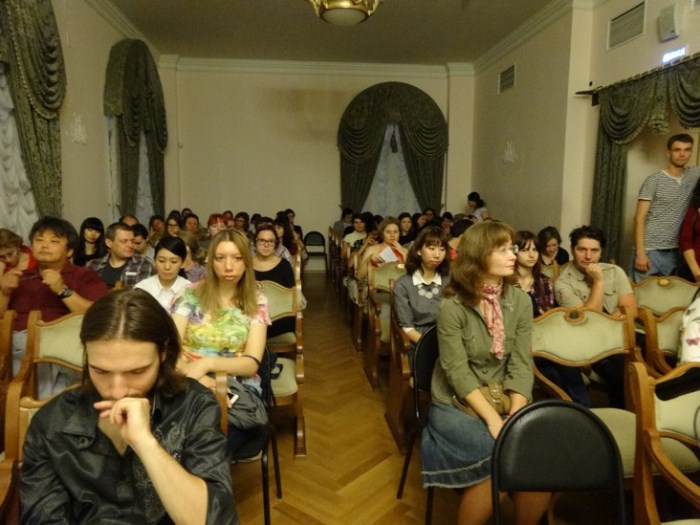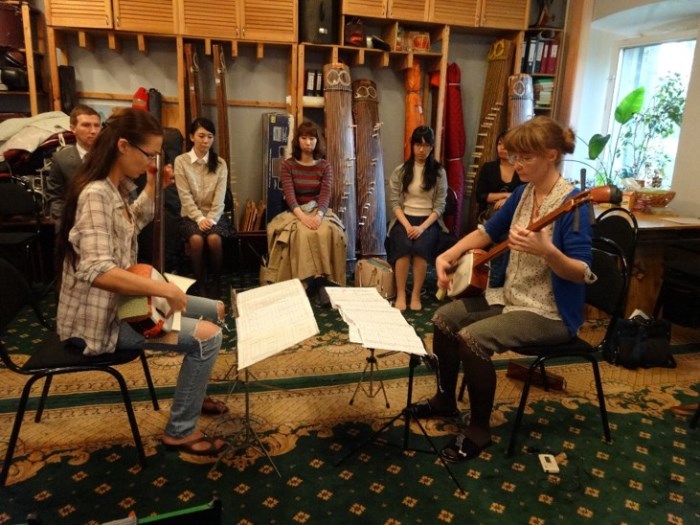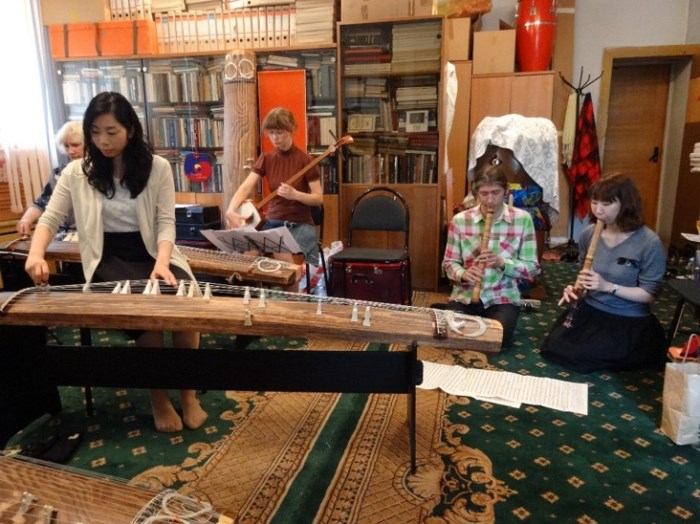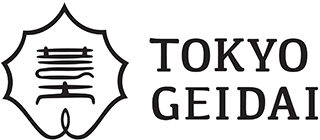アントレプレヌール支援:邦楽科におけるグローバル・キャリア展開Promoting entrepreneurship: Global career development in traditional Japanese music
September 09, 2016
基本情報
研修者:大学院音楽研究科修士・博士課程学生 計5名
研修先:ロシア(モスクワ)
研修期間:2015年9月23日~2015年9月27日
※この研修は、平成27年度「海外派遣奨学金制度」のご支援により行われました。
海外研修の成果
本事業は、本学の優秀な若手邦楽アーティストがモスクワ音楽院主催音楽祭「日本の心」などでの自主企画公演をめざす、グローバル・キャリア展開を支援するものです。公募を経て参加した、学生(出演グループおよび予備調査グループ)を支援対象としました。
渡航準備から現地でのイベントを通じ、4つの支援目的(①グローバル・キャリア展開をめざして戦略的に構想し、実行する契機づくり、②グローバルな舞台で活動・発信するスキルの習得、③国際舞台で役立つ人的ネットワークづくり、④国際舞台における自主企画公演の実現にむけた助成金獲得をめざす契機づくり)に対し、ほぼ一定の成果を得ることができました。
現地では、モスクワ音楽院関係者の先生方から様々な便宜を図っていただき、以下のイベントが実現しました。
a. 音楽祭「日本の心」での自主企画公演
b. 現地邦楽関係者との交流:話し合い、レッスンの参観、演奏交流、予備調査グループの試演会
c. アントレプレヌール支援ワークショップ(全6回)
d. 「民俗研究センター」研究員の方々にご披露いただいた伝統芸能、大ホール演奏会の観覧
音楽祭「日本の心」参加公演の会場は立ち見が出るほどの盛況を博し、約100名の観客は食い入るようにして聴き入り、会場全体に独特な一体感が生まれていました。その聴き方や終演後の歓声からは、邦楽の響きを渇望する耳がモスクワにはたしかに存在すること、その感性が過去20年にわたり世界音楽文化センターによって培われてきたものであることを如実に感じさせました。また、若手邦楽アーティストの活躍の場が言語や渡航手続きなどの障壁を乗り越えればたしかに外国にあること、若手であっても国際文化交流を実現することができ、さらに感性の共有すらも実現できることを目の当たりにしました。

演奏会後には、世界音楽文化センター長のカラトゥイギナ先生をはじめ、現地邦楽関係者の方々から大層お喜びいただき、「来年度以降も今回の出演者を含め、藝大院生・修了生の出演を待望します」との有難い声をお聞きすることができました。経験者が自分たちのみならず後輩にも将来的な可能性を残すことができたという意味では、このことが一番大きな成果だったと言えます。


参加学生のコメント
・実際に足を運ぶということがこんなにも重要であることを再確認させられました。日本の文化を継承する代表者だという強い気持ちで、諦めずに続けていきたいと再確認致しました。
・演奏会をお手伝いしていく中で、ロシアの人々がひとつの音楽として邦楽に興味を持っているということを強く実感しました。物珍しさなどではなく、純粋に演奏会を楽しんでいる様子が見られ、邦楽関係者としてはとても感慨深かったです。
Basic Information
Participants:Five master’s and doctoral students in Music
Location:Moscow, Russian Federation
Period:Sept. 23-27, 2015
Achievements
This project aimed to promote global career development for distinguished young performers of traditional Japanese music at Tokyo University of the Arts (TUA), who intended to individually produce and perform at concerts including the one at the Nihon no Kokoro music festival organized by Moscow Tchaikovsky Conservatory. The participating students in the concert performance and pre-concert field study in Russia were selected from among applicants.
The project had four objectives which were as follows: creating opportunities to strategically draft and implement a plan for global career development, obtaining skills to work and communicate globally, establishing a personal network that is beneficial when working on the global stage, and making opportunities to obtain funding for realizing self-produced concerts. From preparation to actual events in Russia, all these objectives were achieved to a certain extent.
In Russia, the following events were realized, thanks to the great support from faculty members affiliated to the Moscow Tchaikovsky Conservatory.
a. Individually produced performances at the Nihon no Kokoro music festival
b. Exchanges with the local traditional Japanese music community: discussions, observation of lessons, a joint performance, a trial performance by the pre-concert fieldworkers
c. Six entrepreneurship workshops in total
d. Observation of a traditional music performance by members of the folklore research center and a concert at the main hall of the conservatory.
The concert held as part of the Nihon no Kokoro music festival was so successful that some guests even had to remain standing up because they were unable to find their seats. Approximately a hundred guests were eagerly listening to the performances, and the venue was filled with a unique sense of unity. Audience in Moscow seemed to have a true thirst for traditional Japanese music, which was sensed from the manner in which people were listening to the music as well as the enthusiastic applause after the concert. It was also felt that such sensitivity of the Russian audience towards traditional Japanese music had been nurtured over the past 20 years by the World Music Cultures Center. The participating Japanese students witnessed that young performers of traditional Japanese music can succeed overseas if they can deal with language barriers or formalities for international travel, and that, as young performers, they can realize an international collaboration and even share an appreciation for Japanese traditional music with a global audience.

After the concert, the participating students received many voices of appreciation from the people of the local traditional Japanese music community including Dr. Karatygina, the head of the World Music Cultures Center. They kindly asked TUA to send both former and current students including this year’s participants to perform in the festival in the next academic year onwards. This was the biggest achievement for the participants in the sense that they could leave the possibilities for both themselves and their juniors to perform in Russia in the future.




